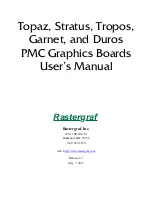
LightPulse Fibre Channel PCI Host Adapter Management
Page 1 of 4
file://E:\emuweb\WWWROOT\ts\fibre-channel\docs\manage pdf\6bbios2.htm
3/24/99
Boot BIOS Utility
Requirements:
l
Intel Pentium computer system, with system BIOS copyrighted 1995 or later
l
MS-DOS 6.0 or higher
l
Installed LP3000, LP6000, LP7000/E or LP8000 host adapter
l
Connected Fibre Channel drive or disk array
Boot BIOS does the following:
l
Supports up to 8 LightPulse Fibre Channel host adapters per computer.
l
Supports multi-initiators on different systems, connected by hubs.
l
Supports multiple disk arrays and LUNs (up to 8 LUNs per ALPA).
l
Detects up to 99 devices per adapter
l
Displays a maximum of 16 devices during the boot process.
This page provides a detailed description of each menu choice on the Boot BIOS Utility
menu. Default options are acceptable for most installation. If a menu is marked as an
"Advanced Option", novice users should accept the defaults.
The Main Menu choices are described below. Select a link for additional descriptions, or
click "Return to top of page" to return to this summary.
Change BIOS boot device/display all devices
Change default ALPA on this adapter
Enable or disable BIOS on this adapter
Change FC Link Timer
Change Extended Link Service Timer
Enable or disable individual devices
Change PLOGI retry timer
Topology selections
Fabric D_ID and WWPN selection
Change BIOS Boot Device/Display All Devices
This option applies to an arbitrated loop (FC-AL) topology only. It shows all drives attached
to the selected host adapter. The adapter is not the boot device, but a drive attached to the
host adapter can be designated as the boot device. The first device in the list is the boot
device. By default, the lowest arbitrated loop physical address (ALPA or AL_PA) of the
device on the first adapter will be the boot disk.
















































